Farming tool reduces time and labour for organic farmers
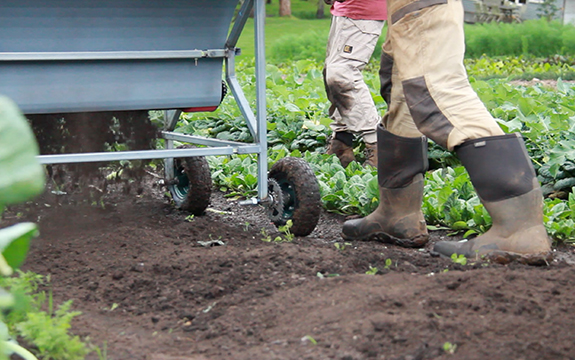
In Summary
- Students design organic farming product for Japanese manufacturer
- Product spreads and dispenses compost in a single action
- Saves time in labour intensive organic farming
A collaboration with Japanese manufacturer Yanmar, the Kyoto Institute of Technology, the SUGAR Network, and Design Factory Melbourne (DFM) has created a time-saving product for organic farmers.
Students Melanie Calleja, Melanie Phillips and Ethan Lankshear, with colleagues from New Zealand and Japan, designed a product for organic farmers to transport, spread and dispense compost in a single action.
A soil supplement spreader, Nu-tan reduces the time and physical labour required for soil bed preparation on organic farms.
“The organic farming industry faces many challenges in upscaling production, including access to land, soil quality, infrastructure and labour. This creates enormous opportunity for new products and services in the organic sector,” says Ms Calleja.
For the 2018-19 academic year, Yanmar proposed a design focus on supporting organic farming for fruit and vegetables. The challenge to students was to research user needs and desires, to develop a new product that provides quality and a holistic user experience for organic fruit and vegetable farmers. This approach aligns with the SUGAR Network’s focus on human-centred design.
Students visited local organic farms and researched organic farming experiences and processes to identify opportunities that improve the daily lives of farmers, workers and farm productivity.
“The challenge was to create a solution for small scale organic farmers of ground grown product that keeps them connected to their crops. We wanted to reduce physical labour and maximise output for organic farmers by making soil preparation efficient and enjoyable,” explains Ms Phillips.
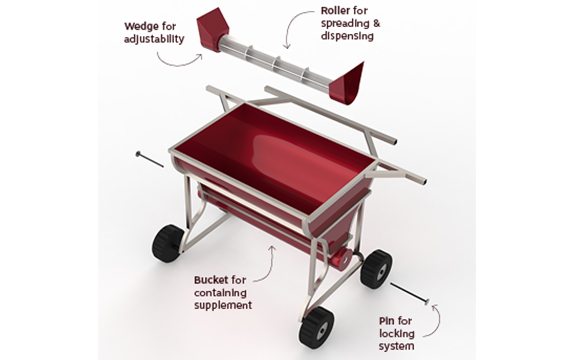
Exploded view drawing of Nu-tan, image supplied by Design Factory Melbourne
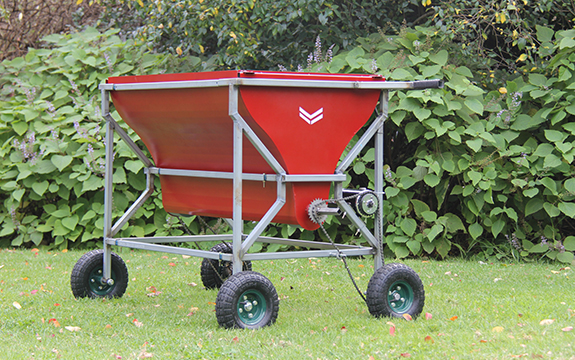
Final Nu-tan working prototype, image supplied by Design Factory Melbourne
Nu-tan is designed to evenly distribute and spread a variety of soil supplements during bed preparation, combining dispensing and spreading of supplements which saves farmers time and physical effort.
“It gives organic farmers time to do the crop handling activities they enjoy,” Ms Phillips says.
“There is a lack of agricultural machinery suited to small scale organic farming. It’s very labour intensive and time consuming. Nu-tan addresses this gap in the market. No two organic farms are the same. Nu-tan adjusts to farmers’ needs and specific farm configurations, so farmers don’t have to change their farm to suit the tool. It also allows farmers to move and spread heavy loads easily,” Ms Calleja says.
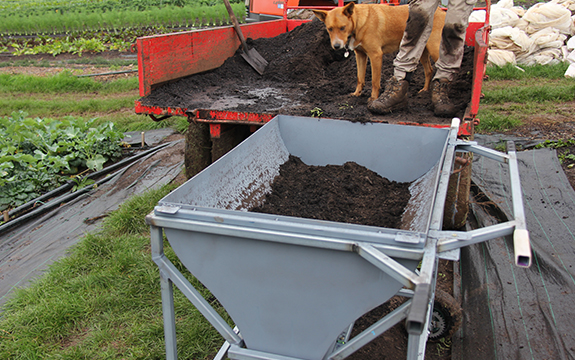
Nu-tan being filled with organic supplement, image supplied by Design Factory Melbourne
The Nu-Tan team tested and validated their ideas at organic farms. They found organic farm bed preparation is labour intensive, and time consuming; and achieving and maintaining soil quality free of pesticides and composting is very important.
Composting and bed preparation is often outsourced due to time and labour considerations and farms are unlikely to use heavy machinery due to the impact on the land and increased carbon emissions.
The team travelled to China to launch the project and travelled to Japan to work together. The final proof of concept prototype was presented at a SUGAR Network EXPO in San Francisco.
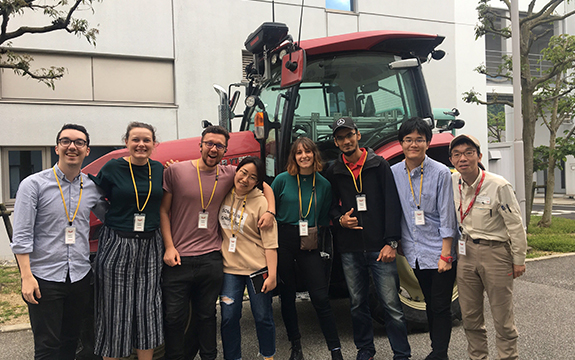
The team at Yanmar in Japan, image supplied by Design Factory Melbourne
Yanmar selected Nu-Tan as its favoured product idea and DFM is confident that Nu-Tan will be developed by Yanmar in support of the organic farming industry.
In 2016-17 DFM students collaborated on a product idea called, Wheebo, developed in collaboration with Yanmar and Kyoto Institute of Technology. Recently launched as a Yanmar start-up, Wheebo is a jet-powered watercraft that allows users to move on the water with agility allowing 360 degrees of movement.

